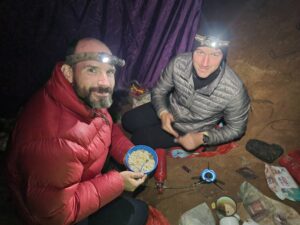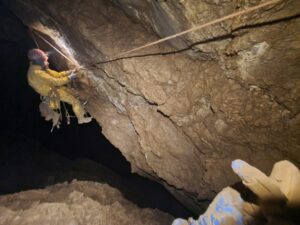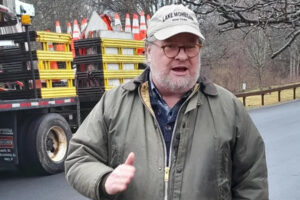
Mark Dickey usually saves people from cave disasters, but last month he generated international headlines after experiencing gastrointestinal bleeding while helping to map one of the world’s deepest caves in Turkey.
A team of around 200 rescuers mobilized to carry him out on a stretcher from 3,400 feet below ground, blasting away walls of rock to widen several pathways.
Dickey recovered, came home to Croton-on-Hudson and soon thereafter traveled to Hungary so he could thank some of his rescuers and then head to Portugal and attend the European Cave Rescue Association’s annual meeting.
Some headlines tagged him as a career caver, but he is a co-founder of BestWeb along with brother Andrew, which began providing internet service in the late 1990s. The village is building a 44-unit apartment house at the site of their former headquarters on South Riverside Avenue.
The brothers sold the company in 2020 so now Mark has more time to explore, teach caving safety and help rescue other people.
Dickey’s subterranean expeditions are “a serious hobby and a passionate activity that emerged from a natural progression of adventure sports, like mountain biking, rock climbing, mountaineering, scuba diving and ice climbing,” he said.

last frontiers of exploration where humans have
never been’ – Mark Dickey. Photo > Jessica Van Ord
Caving represents a more extreme endeavor because the underground labyrinth is “one of the last frontiers of exploration where humans have never been, like the deepest parts of the ocean or outer space,” he said.
“People have climbed just about every mountain and there’s satellite imagery of the entire surface of the Earth, except for a portion of the oceans, but I’m not going to be building a submarine or a spaceship anytime soon, so that’s what caving is for me.”
He credits fiancée Jessica Van Ord, a nurse and skilled rescuer, with saving his life in Turkey.
“I came close to dying three times, but she kept me going by climbing [around a mile] out of the cave, contacting the Turkish government and the European rescue team, requesting supplies, pushing the government to deliver supplies and making the trip back down with a critical IV,” he said.
To Dickey, caving is like reverse mountain climbing because the adventure generally starts at the top and works its way down. The mapping component lays the groundwork for scientists seeking evidence of prior human presence, an unknown species of life or a bacteria to create beneficial medicines, he said.
“This is a precise, meticulous sport that is purely for exploration and science,” he said. “It’s very safe if you compare the number of hours spent versus injuries. What happened to me was a fluke medical condition that neither my doctor nor I knew about. I could have been driving around; this was just bad timing.”
Dickey acquired his thirst for adventure while growing up in Croton and volunteering with EMS, the fire department and the auxiliary police.
“My grandparents spent half their lives here, my parents and I spent our entire lives here,” he said. “With that pedigree, I guess I embody the term ‘Crotonite.’ “
There are interesting caves near Albany, in New Jersey and in Pennsylvania, but what about northern Westchester? “Once in a while, I hear rumors, but pay no attention because they’re probably 10 to 20 feet deep and on private property; it’s a bad idea to trespass,” he said. “There are also some old mines, but people should stay away from them, too.”







